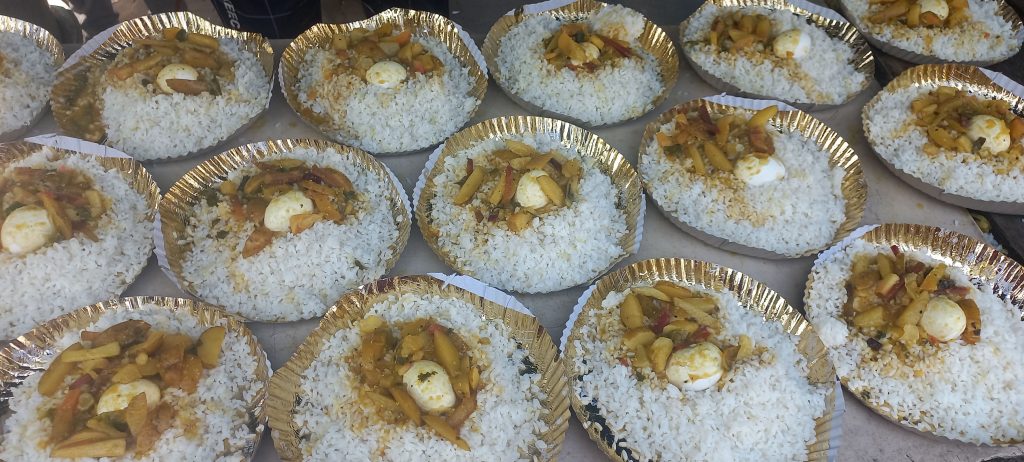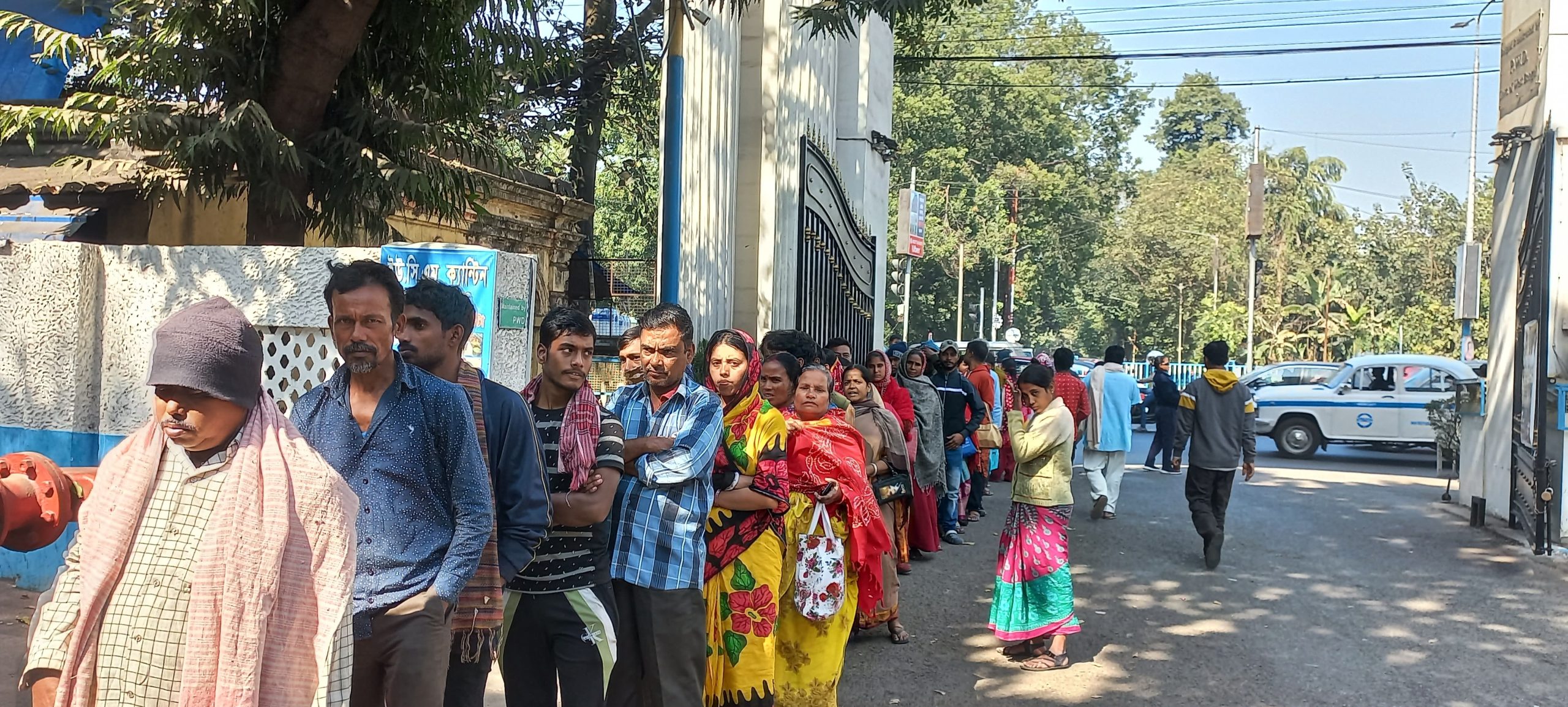Subsidy Meal Scheme in West Bengal, a relief for the poor.
By Bageshri Banerjee
Over 200 people have queued outside a makeshift canteen in the scorching sun inside the Seth Sukhlal Kaelinrnani Memorial (SSKM) Hospital, in Kolkata. These men, women and children are not waiting for a doctor but for food.
Shahara Begum, 54, who works as a help in seven houses in Santragachi in suburban Kolkata, stands patiently in the queue. “Lunch is the only meal I eat,” said Begum, who commutes to Satragachi from Baharampur about five hours away from Kolkata.
She is a single parent with a 16-year-old daughter Afsana who also works as a house help and an 11-year-old son Rizwan.
In February 2021, just before the assembly election Mamata Banerjee, chief minister of West Bengal, launched the Maa Canteen to give a meal to the low-income population of the state for just Rs 5.

In 2013, Tamil Nadu was the first state, under the leadership of former chief minister J Jayalalithaa, to launch a subsidised meal scheme across the state. The Amma Unavagam scheme offered sambar rice, curd rice at Rs 5, idlis and chapatis for Rs 1, became so popular that states such as Rajasthan, Madhya Pradesh, Odisha and Andhra Pradesh emulated it.
Jhuma Pal and her 73-year-old husband from Bangladesh, who are visiting Kolkata for medical treatment, chose SSK Hospital for the cheap treatment and subsidised meals offered by the state through the MAA canteen.
“We came this far because kidney treatment is affordable and eating in the canteen helped me cut costs,” she said.
Like Begum and Pal, Khokon Sardan, a taxi driver from Bihar, also comes to the canteen every day. “What better will I get for Rs.5 than this?” said 53-year-old Sardan who earns Rs. 7,000 a month and has a family of four.
These canteens are favoured by daily wage earners, migrants, and medical tourists who come to Kolkata for work and treatment from nearby towns, and villages around the city.
There are over 53 lakh migrant workers in the state as of 2021, according to Rameshwar Teli, minister of state for Labour and Employment in Rajya Sabha.
West Bengal ranks second in the country with 1.38 crore workers currently working under Mahatma Gandhi National Rural Employment Guarantee Act (MNREGA). MNREGA provides 100 days of unskilled manual labour work distribution to people.
Kolkata, with a population of 15 lakh, has the most number of canteens, at 288, across all districts in the state. The government has opened 485 canteens in the state under the scheme.
These canteens are strategically distributed in a 2:1 ratio (one canteen for every two wards). In 2021, the government allocated Rs 115 crore for the scheme. These canteens run on a cost-sharing model, where the government puts Rs 10 for each meal and the remaining Rs 5 is paid by the beneficiaries.
On average, each canteen feeds around 300 hungry stomachs daily. Every canteen employs four women at a monthly salary of Rs 1500 paid by the Municipal Corporations. An additional Rs 10,000 comes from the State Urban Development Agency (SUDA) as a contingency fund for cooking gas and utensils.
“The success or failure (of the canteen) has a direct impact on the job prospects of daily wage earners,” said Deepanjan Mukhopadhyay, joint director, SUDA, the body overseeing the maintenance and functioning of the canteens.
In Tamil Nadu, the Amma Unavagam scheme, which was once the reason for electoral success for the All India Anna Dravida Munnetra Kazhagam AIDMK), has declined over the years.
The canteen workers in Tamil Nadu said the scheme has failed them. The workers blame the new Dravida Munnetra Kazhagam (DMK) party.
There were 400-odd Amma Unavagam canteens in Tamil Nadu, of which 27 were shut down after Dravida Munnetra Kazhagam -came to power in 2021.
“Across the country, these subsidised schemes are not doing well and cannot do well as governments struggle to fund them after the initial years,” said Seema Bathla, agricultural economist and professor at the centre for the study of regional development, Jawaharlal Nehru University.
In West Bengal, some canteens which earlier served two sabzis, are now offering just boiled potatoes due to inflation and shrinking government kitty.
The opposition party in the state slammed the government for lack of transparency in the scheme.
“The way these canteens are run is just a gimmick to hide the financial corruption that is going on in the West Bengal government,” said Samik Bhattacharya, a former member of the legislative assembly of the Bharatiya Janata Party.

